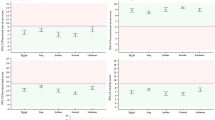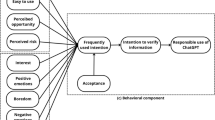Abstract
The development of emotional intelligence in children begins during the early years of a child. Although it is the responsibility of parents to help a child in developing emotional awareness, studies have shown the utility of software systems in aiding this process. In this paper, the author presents the design of an emotionally intelligent chatbot for children. The outcomes of an online survey conducted among the parents reported that 70% of the respondents felt that an emotionally intelligent interactive chatbot can be useful for children to cope with intense subject matters related to low grades, no friends, bullies, and others. The study highlights various features of a chatbot like a user interface, personalization, responsiveness, security, and human intervention. From the findings, the author has suggested five design principles along with the detailed architecture of a chatbot framework. The paper will be useful for future studies that seek to design and develop a highly efficient emotionally intelligent chatbot for children which is trusted by their parents.
Access this chapter
Tax calculation will be finalised at checkout
Purchases are for personal use only
Similar content being viewed by others

References
Li X, Zhong H, Zhang B, Zhang J (2020) A general Chinese chatbot based on deep learning and its’ application for children with ASD. Int J Mach Learn Comput 10(4):1–10
Weizenbaum J (1966) ELIZA–a computer program for the study of natural language communication between man and machine. Commun ACM 9(1):36–45
Yadav S, Chakraborty P (2021) Child-smartphone interaction: relevance and positive and negative implications. Univ Access Inf Soc. https://doi.org/10.1007/s10209-021-00807-1
Santos KA, Ong E, Resurreccion R (2020, June) Therapist vibe: children’s expressions of their emotions through storytelling with a chatbot. In: Proceedings of the interaction design and children conference, pp 483–494
Rita MN, Shava FB (2021, Aug) Chatbot driven web-based platform for online safety and sexual exploitation awareness and reporting in Namibia. In: 2021 international conference on artificial intelligence, big data, computing and data communication systems (icABCD). IEEE, pp 1–5
Piccolo LSG, Troullinou P, Alani H (2021) Chatbots to support children in coping with online threats: socio-technical requirements. Designing interactive systems conference 2021:1504–1517
Ruan S, Willis A, Xu Q, Davis GM, Jiang L, Brunskill E, Landay JA (2019, June) Bookbuddy: turning digital materials into interactive foreign language lessons through a voice chatbot. In: Proceedings of the sixth (2019) ACM conference on learning@ scale, pp 1–4
Lin PC, Yankson B, Lu Z, Hung PC (2019, July) Children privacy identification system in LINE Chatbot for smart toys. In: 2019 IEEE 12th international conference on cloud computing (CLOUD). IEEE, pp 86–90
Stephens TN, Joerin A, Rauws M, Werk LN (2019) Feasibility of pediatric obesity and prediabetes treatment support through tess, the AI behavioral coaching chatbot. Transl Behav Med 9(3):440–447
Ghandeharioun A, McDuff D, Czerwinski M, Rowan K (2019, Sept) Towards understanding emotional intelligence for behavior change chatbots. In: 2019 8th international conference on affective computing and intelligent interaction (ACII). IEEE, pp 8–14
Rahman AM, Al Mamun A, Islam A (2017, Dec) Programming challenges of chatbot: current and future prospective. In: 2017 IEEE region 10 humanitarian technology conference (R10-HTC). IEEE, pp 75–78
Mrsic L, Mesic T, Balkovic M (2020) Feb) Cognitive services applied as student support service chatbot for educational institution. International conference on innovative computing and communications. Springer, Singapore, pp 417–424
Tuli N, Mantri A (2020) Usability principles for augmented reality based kindergarten applications. Proc Comput Sci 172:679–687
Hasal M, Nowaková J, Ahmed Saghair K, Abdulla H, Snášel V, Ogiela L (2021) Chatbots: security, privacy, data protection, and social aspects. Practi Exper Concurr Comput:e6426
Ayanouz S, Abdelhakim BA, Benhmed M (2020, March) A smart chatbot architecture based NLP and machine learning for health care assistance. In: Proceedings of the 3rd international conference on networking, information systems & security, pp 1–6
Author information
Authors and Affiliations
Corresponding author
Editor information
Editors and Affiliations
Rights and permissions
Copyright information
© 2023 The Author(s), under exclusive license to Springer Nature Singapore Pte Ltd.
About this paper
Cite this paper
Rajwal, S. (2023). Design of a Chatbot for Four- to Ten-Year-Old Children Based on Emotional Intelligence. In: Gupta, D., Khanna, A., Bhattacharyya, S., Hassanien, A.E., Anand, S., Jaiswal, A. (eds) International Conference on Innovative Computing and Communications. Lecture Notes in Networks and Systems, vol 473. Springer, Singapore. https://doi.org/10.1007/978-981-19-2821-5_57
Download citation
DOI: https://doi.org/10.1007/978-981-19-2821-5_57
Published:
Publisher Name: Springer, Singapore
Print ISBN: 978-981-19-2820-8
Online ISBN: 978-981-19-2821-5
eBook Packages: EngineeringEngineering (R0)



